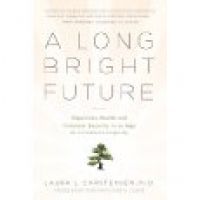Here's To A Long Bright Future
Longevity expert Dr. Laura Carstensen poses a thought provoking question: What are we going to do with our enhanced life spans? After all, Carstensen points out in her book, A Long Bright Future, our generation didn’t expect to live this long. We complain about not having enough time, she notes, but here’s the good news: science and technology have bestowed an extra twenty or thirty years upon us. The problem, she believes, is that too many people are convinced that old age is a time of desolation - and refuse to see the bright side of their destiny. Her mission (as a psychologist and author) is to debunk the myths and misconceptions about aging that prevent people from preparing for healthy, fulfilling and financially stable long lives. Naysayers who claim it’s all downhill after 50 will be heartened to know, she reveals, that studies show that “some abilities do not decline and some even improve .... Older people may be slower on the uptake, but in many instances their knowledge...allows them to outperform their younger counterparts.” While the 318-page book imparts important knowledge, it does so with a sense of humor. Carstensen, the founding director of the prestigious Stanford Center on Longevity, writes: “Make sure you don’t isolate yourself within a group of similarly aged people. As we age, our social networks naturally narrow to those we care for most, so make sure you prune carefully. If everyone on your speed dial went to high school when you did, you’ve pruned too far.”
She isn’t afraid to buck the system, suggesting an alternative to traditional retirement: “Instead of sending older people the message that their usefulness is over at age sixty-five, society should encourage them to continue working in the ways that best suit them. Rather than a firm cutoff age for retirement, I propose a gradual phaseout of work.”
She leaves readers with this inspiring thought: “In this country, which is expected to have more than one million centenarians by the year 2050, the challenge of reinventing very old age will be the greatest social revolution the Baby Boom generation ever faced. ... If there’s one idea you should take away from this book, it’s that there’s much to look forward to. Let’s get moving. Our revolution isn’t over yet.”

